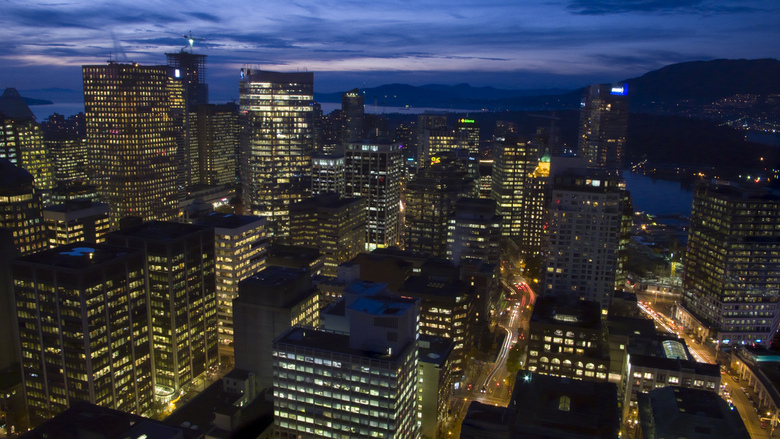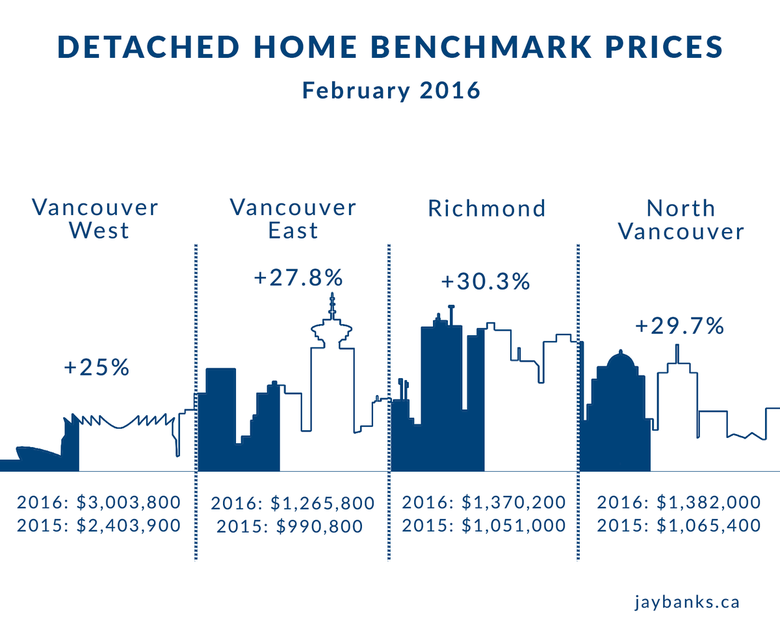In February the Metro Vancouver real estate market continued to rack up records on numbers of sales and rising prices. The sales were 56.3% above the 10 year sales average for the month. In Vancouver West the benchmark price of a detached home rose to $3 million (most of which are treated as building lots), Vancouver East considered working class for the last 100 years comes in at a benchmark price of $1.27 million and the once far flung suburbs of Richmond at a benchmark of $1.37 million and North Van at a benchmark $1.38 million defy belief.
It is particularly mind boggling when every house sells for over the listing price due to demand and resulting multiple offers.
 Vancouver at Night by Sebastian Gregorzyk
Vancouver at Night by Sebastian Gregorzyk
Garry Marr writes in the Financial Post that according to a Sotheby’s International Realty Canada report the high end market defined as sales over $4 million is surging in 2016 in Vancouver and Toronto. Sales in the luxury segment were up 67% in 2015 over 2014 in Vancouver and up 71% in Toronto over the same period.
As described here last month the Globe and Mail threw a rock into the pond in their expose of "shadow flipping" in the Vancouver marketplace and the ripples are still moving outward. The regulatory bodies are taking stock of their practices and the Real Estate Council which licenses and disciplines real estate agents and deals with public complaints has convened an independent advisory group to investigate the practice of "shadow flipping" as disclosed by the Globe and Mail. The group will be chaired by Carolyn Rogers. Rogers is also the superintendent of real estate and the CEO of the Financial Institutions Commission FICOM .The interim report is to be ready on April 8 with the final report to be released in May.
Shadow flipping is the practice of selling the original Contract of Purchase and Sale forward. This allows the "buyer" to sell the contract two or three times to investors before finally transferring title on contract completion date to an offshore investor who pays an extra $500k or more for the property to the middle men who have defrauded the seller of the true price of their home.
The provincial government is also taking a hard look at the practice as there is no Land Transfer Tax (formula: 1% on first $200k, 2% on balance of purchase price) paid on the shadow sales. The Land Transfer Tax is paid by the final buyer when the sale closes and the title is recorded under the Land Title Act. The Land Transfer Tax is a cash cow for the provincial government, returning a billion dollars a year to the Treasury.
One new real estate brokerage composed mainly of Chinese agents who deplored the practices of their previous brokerage New Coast Realty, described in the G&M article as being notorious for "shadow flipping", has announced that it has disallowed "shadow flipping" on any contracts and has instituted in-depth mandatory training programs for all its agents.
New Coast Realty is getting more bad publicity than they ever dreamed of as they host glamourous events to recruit new real estate agents. Their former top performing realtors are picketing their offices and event venues due to the fact that that New Coast Realty is withholding their earned commissions from sales they made while licensed for the New Coast brokerage.
The Canada Revenue Agency has been jolted out of its complacency to look harder at the money laundering going on in the Toronto and Vancouver residential real estate markets. There has long been anecdotal reporting of suspicious funds fuelling the condo building boom as well as individuals purchasing properties.
According to Mike De Souza of Canada.com in 2011 the federal government eliminated a special team of tax auditors tasked with investigating organized crime and integrated the unit’s role into another branch of the Canada Revenue Agency after an internal reviewrecommended increasing government efforts to pursue criminals.
"The agency should determine the extent to which it wishes to strengthen its capability to pursue both criminal non-compliance and non-compliance in the criminal economy and then develop a comprehensive enforcement strategy," said the October 2010 report. The government then did totally the opposite and made it easier for investors/criminals to launder their funds.
CRA is integral to any crackdown on money laundering. A suggestion has been put forward that people can’t just choose to be residents or non-residents for tax purposes. Most jurisdictions require much heavier taxes on non-residents. It is reported that Singapore and Hong Kong apply a 15 per cent stamp tax on non-residents and corporations purchasing property while London charges a 28% capital gains tax when non-residents sell.
According to Diane Francis of the Financial Post there is now a "Kleptocracy Tour" of high end London homes purchased by dirty money. The British press keeps their readership informed of what the international criminals are up to and where they live. According to Francis the Patriot Act and strict banking laws in the US prevent most of what is going on in the UK and Canada.
Bloomberg News under a Freedom of Information Request discovered that CMHC is now looking at who is a foreign buyer, and is looking to find out how many foreign buyers there are in Canada. After consulting 8 federal government agencies for other sources of information on foreign buyers CMHC chose to go with a definition similar to one used by global real estate consulting firm Knight Frank LLP (based in London). Karine LeBlanc as spokeswoman for CMHC stated that "CMHC will measure the level of foreign investment by determining if the property is owned by a person whose permanent residence is outside of Canada." This group will also include international university students whose parents buy them expensive homes near the UBC campus,
According to Bloomberg News "The push for data comes amid concerns that foreign money is boosting prices, making housing unaffordable for locals and putting it at risk of a crash if the funds pull out quickly". One reason CMHC is concerned is that it is the insurer on most of the lower than 20% downpayment mortgages approved by Canadian banks. In 2014 the total liabilities were about $550 billion funded by the federal government and Canadian taxpayer.
The uncertainty with the economy of the People’s Republic of China is a worry to many. As China revalued the Yuan Renminbi and stock markets plummeted there was a rush to remove funds by well to do Chinese citizens. There have been corruption trials against former Party favourites and now there is some concern that President Xi Jinping may try to stop the flow of funds. The Chinese government will not want to cause any unrest although they are stamping out any form of protest that has been allowed to date. According to Bloomberg approximately US$1trillion left the country in 2015, much of it into the West Coast real estate markets of Vancouver, Seattle, San Francisco and Los Angeles.
According to the Vancouver Province, Seattle lawyer Dan Harris who is involved in facilitating trade with Chinese businesses says there has been a concerted effort to stop the flow of funds by examining the export deals that allow the money to leave the country. It is difficult for wealthy buyers to get their funds out to buy $3 million+ homes in Canada and the US.
The government of China is permitting their favourite large insurance companies to invest in commercial properties in major cities in Canada and the US as reported here last month. The Angbang Insurance company has been allowed to pay billions for the Waldorf Astoria Hotel in New York City and the Bentall complex in Vancouver. The government wants to have access to high end investment properties. It is not happy about the outflow of cash for personal residences.
There has been much discussion over the vacant homes that dot Vancouver and hollow out many expensive neighbourhoods. BC Hydro decided to try to come up with a formula to determine if a home is vacant. They hired a technology firm to check 225,000 properties. Barbara Yaffe explains the methodology as follows: homes were declared vacant if electricity use showed little variation for 25 days of the month. If there was no action in non-heating months of August/September of one year and the June and July of the following year it was declared empty.
The methodology is a bit suspect because it can’t determine if a property is vacant or the owner uses it a few times a year or it is rented as an Airbnb. As it turns out most of the vacant homes in 2014 were located north of 16th Avenue and west of Cambie Street which includes Kitsilano and Point Grey. According to the Hydro report the overall vacant home rate of about 1% hasn’t changed much since 2002. There is a higher vacancy rate in condos at 12.5% while purpose built rental housing is always occupied.
The outcry about offshore investors pushing the prices sky-high turns out not to be entirely true. There are many buyers out there with lots of money and Vancouver is the shining city on a hill. Despite the high real estate prices on every other metric in the Quality of Living Survey by Mercer it came in first in North America and fifth in the world. It is the only North American city to be included in the Top 10 of the World.
Mercer spokesman Gordon Frost says "Quality of living continues to be high in Canada, with a stable political environment and positive social benefits, offering a very desirable and safe place to live and work for residents and expatriate employees."
JB00DT

